death

“Inside the soul of this accountant who loves his job and loves his wife and loves his son, is this dancer,” Hiddleston said during a press conference. “And that might be true of anyone you know or anyone you see on the street … Inside that human being is greater breadth and depth and range than we could possibly imagine.”
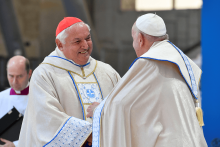
An old Italian saying warns against putting faith, or money, in any presumed front-runner ahead of the conclave, the closed-door gathering of cardinals that picks the pontiff. It cautions: “He who enters a conclave as a pope, leaves it as a cardinal.”
But here are some cardinals who are being talked about as “papabili” to succeed Pope Francis, whose death at the age of 88 was announced by the Vatican on Monday.
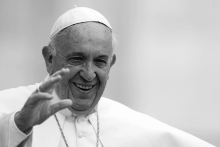
Pope Francis, the first Latin American leader of the Roman Catholic Church, has died, the Vatican said on Monday, ending an often turbulent reign marked by division and tension as he sought to overhaul the hidebound institution.

I’ve been caring for the dying since I was 22 years old. Before the rise in death doula work, I was a caregiver for my mother, who died of primary peritoneal carcinoma at 58 –years old. I sat with her during her chemotherapy appointments. I took notes at appointments with doctors. I created a rapport with her medical team so that I could be in the best position to advocate for her up until the very end.

I LIVE IN Rwanda, a beautiful East African country also called the Land of a Thousand Hills. We have a saying here: “When you are well, you belong to yourself, but when you are sick, you belong to your family.” But my first trip to the United States taught me that culture matters, particularly in the context of end-of-life care.
In a palliative care education and practice course at Harvard Medical School, I learned the principle of patient autonomy — that individuals have the ultimate authority to make decisions about their own health care. Patients are “in control.” But while shadowing my mentor at Massachusetts General Hospital, I noticed photos of family members in patients’ rooms. I remember asking, “Where are the people who are shown in the photographs?” I now know that this may be an attempt to recreate a family or to provide a last chance to reconnect with life, but all the people I saw in the pictures were alive — why were people trying to create an illusion of family when the family exists?
I asked my mentor, “How can we bring back those people from the photos to the room?”
Of course, I came with my bias and an African perspective on end-of-life care. Here, decision-making is based on patient autonomy and community responsibility, because one aspect does not exclude the other. There is synergy between them.
In Rwanda, there are no photos in the patient’s room. Instead, there are people.

“Jimmy Carter’s importance to faith and public life was reintroducing into the public square the principles that animated nineteenth-century evangelicals: concern for the poor, racial equality, peacemaking, human rights and equality for women,” Randall Balmer, professor of religion at Dartmouth told Sojourners. “He did so as an avowed and unapologetic Baptist, which means that he respected the First Amendment and the separation of church and state.”
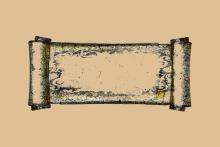
IN THE EARLY days of the pandemic, I started a death scroll. Not to be confused with “doomscrolling” (a malady related to one’s smartphone), my death scroll was a physical length of paper on which I penned names and death dates as I learned of them.
Across the top I scrawled: “Blessed are you, Lord Our God, Who Is Keeper of the Book of Life. Today, we learned that Sister Death called ...” On March 13, 2020, I wrote the first name: Barbara Clementine Harris. A towering figure in the American church, Harris registered Black voters in Mississippi in the 1960s, marched from Selma to Montgomery in 1965, and was one of the first 11 women “irregularly” ordained as Episcopal priests in 1974 and the first female bishop in the Anglican Communion. But, because of the COVID lockdown, no churchwide memorial service was held for her.
Pandemics bring death. And, as Christians, it’s impressed upon us to remember. Remember the Sabbath. Remember that your ancestors were slaves in Egypt. Do this in remembrance of me. Remember my chains. But ... I have a very bad memory. So, I made the scroll. When I stopped collecting names in late 2022, my scroll held 36. How many names would your scroll hold?
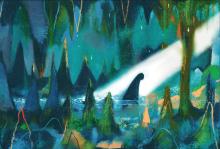
This spring, we’ll gather for a third time
since we first lost our forebears, martyrs to a cause
they did not choose for themselves.
Beloved grandmothers spent their last nights alone
in crowded hospital rooms while officeholders
deliberated over the what, not the what now or the how.

Being unafraid of death is easier said than done. Death is one of the great fears that stalks the minds and hearts of human beings. That being said, there are times when Paul still dares to mock death: “‘Where, O death, is your victory? Where, O death, is your sting?’” (1 Corinthians 15:55). As a pastor, I have held plenty of hands as people die, yet I have never heard such boasting. What I have heard are regrets, contentment, fear, and any number of emotions. How we face death is complicated.

WHEN I STEPPED off our back porch that June morning, some kerfuffle of squawks, feathers, and paws stopped me. There was Tom, our all-gray feral cat, slinking about. Then I made out some red streaks above — cardinals. I noticed Tom had something in his mouth. I cringed. Legs? Wings? Tail? Head? It was a baby bird. Its parents were hot on Tom’s trail.
Some sense of moral — my husband would say unnecessary — responsibility got hold of me. In that moment, I decided I was not going to let the cat I had brought into this backyard eat that bird, no matter how many birds he’d already nabbed. I yelled and chased Tom. And after I shamed the cat into dropping his prey under the trampoline, my 8-year-old son, Oliver, rescued the fledgling.
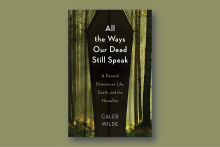
CALEB WILDE is familiar with death. He is the descendant of two long-term generational funeral home families and went into the funeral industry himself. His first book, Confessions of a Funeral Director, delved into some of the more uplifting stories he’s had in death care. His latest book, All the Ways Our Dead Still Speak, is more introspective.
The early chapters detail a few death experiences — an atheist seeing the dead parents of her husband as he dies, for instance — and at first, that’s what I thought the book would be about: exploring what people’s deathbed visions meant to them, regardless of whether those visions were real. But for Wilde, that’s missing the point. What matters is that the dead are still speaking to us. Death isn’t necessarily an end, Wilde argues — it’s a transformative experience; the living carry inside us the essence and dreams of the dead. Open conversations about death and dying can lead to a healthier society.
Wilde specifically calls out white people, his ancestry and mine, for being disconnected from their ancestors. He cites the difference between the polite, private, quiet funerals of white people versus the communal, intensive, emotional funerals of Black people. Many white people believe that grief is a personal, private journey. However, in many Black families and cultures all over the world, grief is a communal process. People come together to remember, love, and support each other. In these times, they cease to become individual selves and instead focus on the plural self — on community: A community of people both dead and alive.

Viewers would be wise to approach The Sandman expecting a slow burn rather than a breakneck action extravaganza. There’s plenty of horror, but these moments are spaced out through the deeply human moments of Morpheus coming to terms with what it means to serve humanity.

Whatever the cause of the loss, the result is uniquely painful but universally true: We’re left to pick up the pieces amid waves of grief, while those around us struggle to know what to say — a struggle that dates back to biblical times.
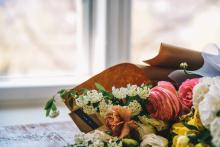
Rituals surrounding death provide solace and comfort. Ceremonies, such as funerals, hold our challenging and complicated emotions and provide space for us to acknowledge and accept the reality of death. But when we are not able to be physically held by those outside of our own home or partake in our religious rituals and death traditions, how do we process the death of those we love? Even as states reopen and larger groups are permitted to gather, some people are still apprehensive about convening. In this unfamiliar and uncertain moment, how do we mourn?

O God, we grieve the struggle of those who died alone —
so far from friends and neighbors, from all they’d ever known.
We grieve for precious people who could not say good-bye;
we weep for those, now mourning, who sit alone and cry.

The United States surpassed 100,000 deaths related to the novel coronavirus on Wednesday.
It’s a staggering number representing nearly a third of the 353,011 COVID-related deaths worldwide. In the U.S., more Americans have died of the virus than in the Iraq, Afghanistan, Vietnam, and Gulf wars combined.

THE HYMN “I Sing a Song of the Saints of God” is one of my favorites in the Episcopal tradition, usually sung on All Saints Day. It concludes with the line, “For the saints of God are just folk like me / And I mean to be one, too.” It’s a reminder of the people in our lives—living and otherwise—who are everyday saints, not canonized but important in our formation.
In Dick Johnson Is Dead, filmmaker Kirsten Johnson celebrates her father, one such everyday saint. Dick isn’t actually dead, but he has been diagnosed with Alzheimer’s. How much of his life remains isn’t certain, but Johnson is determined to show him just how well he’s loved by trying to rid him of some of his fear of death.
Johnson does this in a darkly funny way that’s true to her dad’s mischievous streak: She collaborates with him on a series of staged scenes depicting his death from a variety of accidents. Dick is crushed by an air conditioner, falls down stairs, is hit by a construction worker’s nail-filled board, and more. “Everyone dies,” Johnson reminds us, even the people we love the most.

In an effort to help our family grieve the loss of our beloved Vickie Lee Jones, a preacher told us that it was God’s will that a white man named Gregory Alan Bush shot her to death in the parking lot of a Kroger grocery store outside of Louisville, Ky. because, as a witnesses implied, she was black.
It was not.
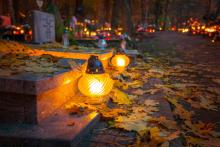
Creation is all one thing, like a giant blanket. There are many threads on the blanket, all woven tightly together. When someone dies, they move from one thread to an adjacent one, but they’re still wrapped snugly around us, and not just in some metaphorical way.

Whitney has been drawn to such existential questions since her youth. The collision of what she called her family’s rational and secular Unitarian background with the more traditional Russian Orthodoxy of others in her wider family circle ensured that.